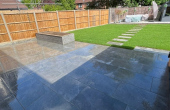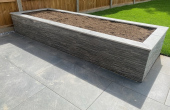Telephone: 0118 229 2486
Home›News›Patio Slabs and Tile options with Daniel Moquet - which to choose and why?
Patio Slabs and Tile options with Daniel Moquet - which to choose and why?
Introduction
The allure of a garden lies not just in its flora and fauna, but also in the design choices made to accentuate its beauty. Among the pivotal decisions homeowners face when renovating their outdoor space is the selection of patio slabs and tiles. Each material brings with it a unique set of characteristics, aesthetic appeal, and functionalities.
This article delves deep into the world of patio slabs and tiles, offering insights into each material's properties and helping you chart the path to a garden that resonates with luxury, comfort, and style.
Understanding Your Options
Every garden is unique, and so are the preferences of homeowners. While some seek a natural and rustic look, others may lean towards sleek and contemporary styles. The choice of patio slabs and tiles plays a crucial role in achieving these desired aesthetics. Let's embark on a journey to understand the variety of materials available and how they could potentially transform your outdoor space:
Porcelain: Known for its strength and durability, porcelain tiles are crafted from refined clay, giving them a polished look. They come in a range of colours and designs, offering a modern touch to any garden.
Slate: A natural stone characterised by its rich textures and colour variations, slate tiles offer an earthy feel to patios. They are known for their rugged appearance and longevity.
Sandstone: A popular choice for those seeking a rustic touch, sandstone slabs boast beautiful natural patterns and are available in various hues, from soft beiges to deep browns.
Natural Stone: An umbrella term, natural stone encompasses a range of materials, including limestone, granite, and more. Each stone type has its own set of characteristics, ensuring that there's something for every garden theme.
Granite: Recognised for its granular appearance and strength, granite tiles are ideal for homeowners seeking a mix of luxury and durability. They're resistant to wear and tear and add a touch of elegance to any outdoor space.
Limestone: A softer stone, limestone offers a smooth finish and is known for its pale, neutral colours. It's perfect for those looking for a minimalist and calming garden space.
Each material has its own set of pros and cons, and understanding them can be pivotal in making the right choice for your garden. In the sections to follow, we will delve deeper into each material, exploring their benefits and considerations, helping you make an informed decision for your outdoor haven.
Porcelain Tiles: Pros, Cons, and Aesthetic Appeal
Porcelain, often hailed as a front-runner in the world of outdoor tiles, is admired for its refined appearance and robust characteristics. But, like any material, it has its own set of advantages and considerations. Here's a comprehensive look:
Advantages:
Durability: Porcelain tiles are known for their impressive strength. Their low porosity ensures they are resistant to moisture, making them an excellent choice for the unpredictable British weather.
Low Maintenance: Unlike some natural stones that might require regular sealing, porcelain tiles are relatively hassle-free. A simple wash-down is often enough to keep them looking pristine.
Versatility: Available in a plethora of designs, colours, and textures, porcelain allows homeowners to achieve a bespoke look tailored to their aesthetic preferences.
Resistant to Stains and Scratches: Due to its dense nature, porcelain is less susceptible to staining and can resist scratches, ensuring a long-lasting pristine appearance.
Considerations:
Cost: High-quality porcelain tiles can sometimes come with a heftier price tag compared to other materials. However, considering their longevity and low maintenance, many find it a worthy investment.
Installation: Laying porcelain tiles requires a certain level of expertise. It's recommended to engage professionals, like those at Daniel Moquet, to ensure a smooth and lasting installation.
Aesthetic Appeal:
Porcelain exudes a contemporary charm. Its ability to mimic other materials, such as wood or natural stone, without the associated maintenance hassles, makes it a favourite among homeowners who seek a modern yet timeless garden appeal. From matte finishes that offer a muted elegance to glossy options that add a touch of luxury, the design possibilities with porcelain are virtually endless.
Slate: A Natural Marvel
Slate, with its textured finish and rich colour variations, has long been a cherished choice for outdoor spaces. This metamorphic rock, formed under immense pressure and heat, brings an old-world charm combined with durability.
Advantages:
Natural Beauty: Slate's distinct layered appearance, combined with a palette ranging from deep greys to rustic greens and purples, adds depth and character to any garden.
Durability: Slate is incredibly resilient against the elements. Its natural formation process has made it weather-resistant, making it ideal for the often-changeable British climate.
Eco-Friendly: As a natural stone, slate is an environmentally friendly choice, appealing to homeowners who are conscious about reducing their carbon footprint.
Non-Slip Surface: The textured surface of slate tiles offers a natural grip, reducing the risk of slips, especially during wet conditions.
Considerations:
Weight: Slate is relatively heavier compared to some other materials. Proper foundation and installation are essential to ensure its longevity.
Maintenance: Over time, slate may require sealing to maintain its appearance and prevent water absorption.
Aesthetic Appeal:
The rustic allure of slate seamlessly blends with a range of garden styles, from traditional cottage gardens to more contemporary designs. Its natural finish provides a contrasting backdrop to lush greens and vibrant floral arrangements, making it a favourite among homeowners and garden designers alike.
Sandstone: Rustic Charm for Every Garden
Sandstone, with its warm hues and natural grain patterns, imparts a countryside feel that’s hard to replicate. Formed from compacted sand and held together by natural cement, such as silica, its beauty is as timeless as the processes that created it.
Advantages:
Varied Colour Palette: Ranging from light beige to reddish-brown, the diverse tones of sandstone allow for customised design schemes that reflect a homeowner's individual style.
Natural Texture: The porous nature of sandstone provides a non-slip surface, a crucial feature for outdoor settings, particularly in damp conditions typical of British autumns.
Heat Retention: Sandstone naturally retains heat, making it a pleasant surface to walk on during cooler days, and even into the evening.
Economical: Compared to other stone materials, sandstone is often more budget-friendly, making it accessible for a wider range of projects.
Considerations:
Porous Nature: The very feature that provides its non-slip quality also makes it absorbent. Proper sealing can prevent unwanted water retention and potential damage.
Wear Over Time: Given its relatively softer composition, sandstone can show wear, especially in high-traffic areas. Regular maintenance can prolong its pristine appearance.
Aesthetic Appeal:
Sandstone's earthen charm complements both modern and traditional garden layouts. Its textured finish juxtaposed against smooth garden furniture or modernist sculptures can create captivating contrasts, ensuring a garden that's not only functional but also visually arresting.
Natural Stone: The Epitome of Elegance
Natural stone tiles, often hailed as the cornerstone of luxurious garden designs, have long been a symbol of sophistication. With myriad options to choose from, such as granite, limestone, and travertine, homeowners are spoiled for choice, each bringing its own unique flair.
Advantages:
Timeless Beauty: Whether it's the intricate patterns of granite or the subtle elegance of limestone, natural stone has a unique character that evolves over time, adding depth and beauty to gardens.
Durability: These stones are known for their longevity. With the right care, they can weather decades, if not centuries, making them a long-term investment.
Versatility: Natural stone complements almost any garden design. Whether it's a minimalist zen garden or a lavish English courtyard, there's a stone to match the aesthetic.
Value Addition: Incorporating natural stone can significantly boost the value of a property, making it a wise choice for homeowners thinking of future resale value.
Considerations:
Cost: The premium nature of natural stone tiles means they come with a higher price tag compared to more conventional materials. However, their durability can offset this cost over time.
Maintenance: Natural stones require sealing to protect against stains and weathering. Regular maintenance ensures they retain their elegance.
Aesthetic Appeal:
The chic and polished look of natural stone offers unparalleled luxury. Their refined beauty, combined with the ambient surroundings of a well-designed garden, can transform any outdoor space into an oasis of calm and luxury.
Granite: A Contemporary Choice
Regarded as one of the hardest materials on earth, granite's resilience is only surpassed by its aesthetic appeal. With its crystal-rich composition and unique colour patterns, it brings a modern edge to any outdoor space.
Advantages:
Robust and Long-lasting: Granite's toughness ensures that it resists wear and tear, even in high-traffic areas. It's a material that looks as new as the day it was laid, year after year.
Resistant to Weather: Whether it's the pouring British rain or beautiful sun, granite remains unaffected. Its low porosity ensures minimal water absorption, reducing the risk of damage from freezing conditions.
Maintenance-Free: One of granite's selling points is its low maintenance. Its natural resistance to stains and its non-porous nature means it rarely requires any sealing or special care.
Variety: From speckled grey patterns to rich blacks and deep blues, granite offers a diverse colour palette, allowing homeowners to find the perfect match for their design ambitions.
Considerations:
Cost: Being a premium material, granite comes at a higher cost compared to some other patio options. However, its longevity and low maintenance often justify the initial investment.
Installation: Given its weight and density, granite installation can be more labour-intensive, necessitating expertise for a flawless finish.
Aesthetic Appeal:
Granite's sleek and polished look is a favourite among contemporary designers. Whether used as a centrepiece or as an accent in combination with other materials, its presence elevates the style quotient of any outdoor space.
Limestone: Ageless and Understated
Limestone, with its delicate shades and characteristic grain, has always been a favourite for outdoor spaces, especially in the British countryside. Its muted tones and natural finish provide a neutral backdrop that beautifully complements the greenery of gardens.
Advantages:
Subtle Elegance: Limestone’s earthy tones and gentle patterns add a touch of understated luxury to patios and pathways.
Flexibility in Design: Available in various finishes – from honed to tumbled – limestone offers flexibility, allowing homeowners to achieve both modern and rustic looks.
Thermal Resistance: Limestone remains relatively cool underfoot, even on warmer days, making it a comfortable choice for sunny patios.
Natural Texture: The inherent grain and texture of limestone provide a non-slip surface, an essential feature for outdoor tiles.
Considerations:
Porosity: Being a porous stone, limestone requires sealing to prevent stains and potential damage from the elements.
Susceptibility to Acids: Limestone can react with acidic substances, which can result in etching. It's advisable to clean spills promptly and use pH-neutral cleaning agents.
Aesthetic Appeal:
Limestone’s serene and timeless beauty brings a touch of nature to outdoor spaces. When set amidst a backdrop of lush plants and flowers, it creates a harmonious and tranquil setting, reminiscent of old English gardens.
Making the Decision: Factors to Consider
Choosing the right material for your patio is not just about aesthetics. Several factors come into play when making an informed choice. With countless homes in Berkshire, from bustling Reading to the serene pathways of Ascot, showcasing varied patio styles, it's evident that these choices are often a result of careful consideration. Here's a guide to help you make that pivotal decision.
Durability and Longevity
A patio is a long-term investment. Before making a choice:
Assess the material's strength: Will it withstand the foot traffic it will encounter?
Weather Resistance: Consider the typical weather conditions in your area. Is the material resilient enough to withstand freezing winters or the occasional downpour?
Maintenance Requirements
Cleaning: Some materials, like granite, require minimal maintenance, while others, like limestone, need regular sealing to maintain their sheen.
Repairs: Consider the ease with which a tile or slab can be replaced or repaired if it gets damaged.
Aesthetic Appeal and Design Flexibility
Colour and Pattern Variety: While granite offers unique veining, limestone brings in an earthy elegance. Your choice should reflect the mood and style you wish to achieve.
Finish Options: Some materials offer multiple finishes – from polished to matte or textured. This can significantly influence the overall look of your patio.
Cost Implications
Initial Costs vs. Long-Term Value: While some materials might be costlier upfront, they might prove economical in the long run due to their durability and minimal maintenance.
Installation Costs: Apart from the cost of the material, consider the installation charges, especially if the material requires specialised handling or preparation.
Conclusion
Choosing the right material for your patio slabs and tiles is not a decision to be taken lightly. Your outdoor space is an extension of your home, and it deserves the same level of care and attention to detail as any room inside. With the myriad of options available, from porcelain to limestone, every homeowner has the chance to create a unique and personalised space that mirrors their style and the functional needs of their family.
Yet, while the appeal and durability of the materials matter, so does the craftsmanship with which they're laid. Daniel Moquet brings a blend of international best practices and local expertise, ensuring your outdoor space isn't just beautiful, but it also stands the test of time. With decades of experience in the landscaping industry and a commitment to excellence, making the decision to work with professionals like Daniel Moquet guarantees an outdoor area that you'll cherish for years to come.
If you're in Berkshire, Reading, Ascot, or any of the neighbouring areas, and you're contemplating giving your garden or outdoor space a makeover, don't hesitate. Reach out to Daniel Moquet today for a consultation, where our experts will guide you through the process, helping you make informed decisions every step of the way. Discover the potential of your outdoor space and transform it into the haven you've always dreamed of. Contact us today to explore more of our exceptional services.









 Over 40 years of experience working collectively
Over 40 years of experience working collectively A 'Quality Service Guarantee'
A 'Quality Service Guarantee' Premium industry-leading products
Premium industry-leading products